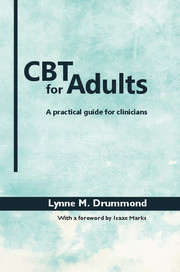Book contents
- Frontmatter
- Dedication
- Contents
- List of tables, boxes, figures and case examples
- Foreword
- Preface
- Structure of the book
- List of abbreviations
- 1 Introduction
- 2 Assessment
- 3 Rules of reinforcement and practical examples
- 4 Social skills training
- 5 Relationship, communication and sexual skills training
- 6 Phobic and social anxiety
- 7 Treatment of obsessive–compulsive disorders
- 8 Depression
- 9 Generalised anxiety disorder and panic
- 10 Body dysmorphic disorder and the somatic symptom and related disorders
- 11 Eating disorders
- 12 Addictive behaviour
- 13 Schizophrenia and the psychoses
- 14 Personality disorder
- 15 CBT in combination with other therapy
- Glossary
- Index
- Frontmatter
- Dedication
- Contents
- List of tables, boxes, figures and case examples
- Foreword
- Preface
- Structure of the book
- List of abbreviations
- 1 Introduction
- 2 Assessment
- 3 Rules of reinforcement and practical examples
- 4 Social skills training
- 5 Relationship, communication and sexual skills training
- 6 Phobic and social anxiety
- 7 Treatment of obsessive–compulsive disorders
- 8 Depression
- 9 Generalised anxiety disorder and panic
- 10 Body dysmorphic disorder and the somatic symptom and related disorders
- 11 Eating disorders
- 12 Addictive behaviour
- 13 Schizophrenia and the psychoses
- 14 Personality disorder
- 15 CBT in combination with other therapy
- Glossary
- Index
Summary
This book is designed for clinicians as a practical guide to treating adults with psychological and psychiatric disorders using cognitive and behavioural interventions. I firmly believe that clinicians learn best from patients, and so I have included illustrative case history material throughout. The book is similar in format to an earlier book I co-authored with Richard Stern, The Practice of Behavioural and Cognitive Psychotherapy, published in 1991. Indeed, a few of the case histories originally appeared in the earlier book but are still relevant and I am extremely grateful to Richard Stern and Cambridge University Press for allowing me to reuse them here.
The whole subject of cognitive–behavioural psychotherapy has developed significantly since that first volume. In 1991, the ‘cognitive revolution’ was taking hold and cognitive therapy was being hailed as a panacea for a whole range of psychiatric and psychological conditions. Sadly and inevitably, it did not live up to all the claims that were then being made. More recently the role of cognitive interventions has been identified in a number of conditions, including depression and anxiety disorders. Cognitive therapy is a useful and often necessary adjunct for the treatment of other conditions, including body dysmorphic disorder, health anxiety, hypochondriasis and social anxiety. The development of the so-called ‘third generation’ or ‘third wave’ therapies has seen a move back to behavioural treatments with less emphasis on the cognitive elements. All these more recent interventions are described but with a note of caution that there is still a relative lack of good-quality, robust research on many of these.
The aim of this book is to be a practical guide to interventions using clinical examples. It is not full of theory. A theoretical overview is presented in each chapter and is developed as different approaches are discussed. This is designed to ensure a clinician understands why different techniques may be applied to different patients. Key references are presented so that anyone who is interested in looking into this further can easily do so, and I have also listed books for further reading.
- Type
- Chapter
- Information
- CBT for AdultsA Practical Guide for Clinicians, pp. xv - xviPublisher: Royal College of PsychiatristsPrint publication year: 2014



